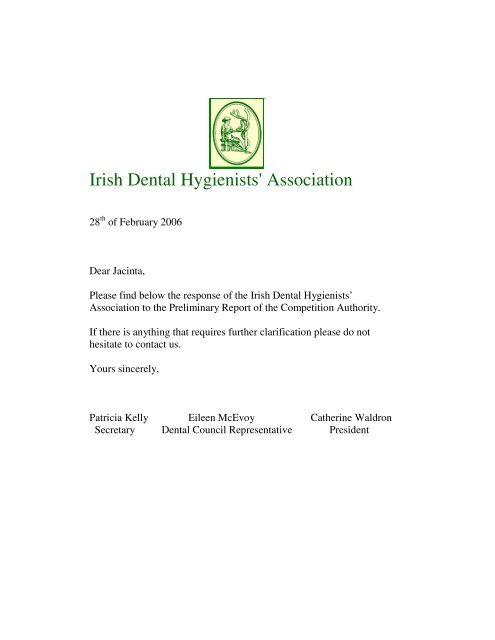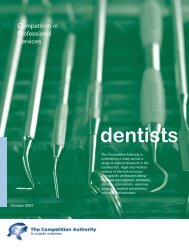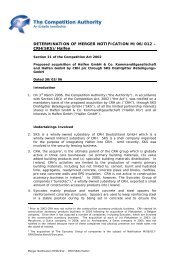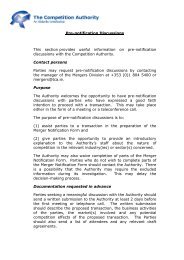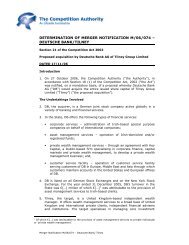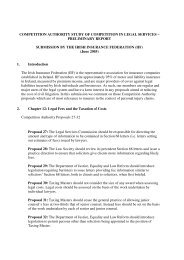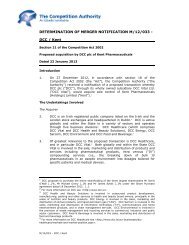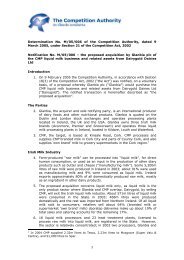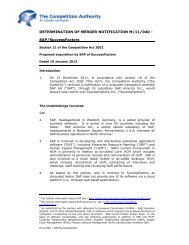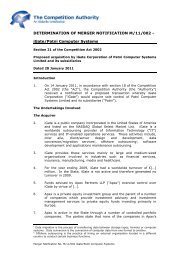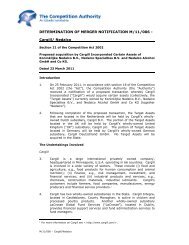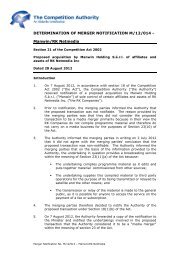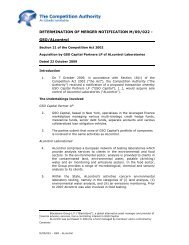Irish Dental Hygienists' Association - The Competition Authority
Irish Dental Hygienists' Association - The Competition Authority
Irish Dental Hygienists' Association - The Competition Authority
Create successful ePaper yourself
Turn your PDF publications into a flip-book with our unique Google optimized e-Paper software.
<strong>Irish</strong> <strong>Dental</strong> <strong>Hygienists'</strong> <strong>Association</strong><br />
28 th of February 2006<br />
Dear Jacinta,<br />
Please find below the response of the <strong>Irish</strong> <strong>Dental</strong> Hygienists’<br />
<strong>Association</strong> to the Preliminary Report of the <strong>Competition</strong> <strong>Authority</strong>.<br />
If there is anything that requires further clarification please do not<br />
hesitate to contact us.<br />
Yours sincerely,<br />
Patricia Kelly Eileen McEvoy Catherine Waldron<br />
Secretary <strong>Dental</strong> Council Representative President
<strong>Irish</strong> <strong>Dental</strong> <strong>Hygienists'</strong> <strong>Association</strong><br />
<strong>The</strong> <strong>Irish</strong> <strong>Dental</strong> Hygienist’s <strong>Association</strong> welcomes the preliminary report of the<br />
<strong>Competition</strong> <strong>Authority</strong>.<br />
Q1. Is the report’s analysis at any stage based on erroneous or incomplete<br />
factual information? If so, how does this affect the recommendations?<br />
<strong>The</strong> committee felt that there was a general misconception regarding the role of a<br />
<strong>Dental</strong> Hygienist in the Report, and that this could lead to a misunderstanding of the<br />
level of responsibility already held by <strong>Dental</strong> Hygienists, and the increase in the level<br />
of responsibility that would be entailed in practicing independently. For this reason<br />
we have summarised the role of the <strong>Dental</strong> Hygienist for your information.<br />
An overview of the role of the <strong>Dental</strong> Hygienist.<br />
<strong>The</strong> role of the <strong>Dental</strong> Hygienist is to improve the oral and dental health of the public,<br />
individually, or in groups, in collaboration with and under the supervision of a<br />
Dentist. This is achieved through preventive and therapeutic procedures.<br />
Holistic approach to patient care.<br />
1. Taking of medical history (understanding of the implication for treatment)<br />
2. Taking clinical history<br />
3. Extra oral and intraoral examination of soft tissues to detect any abnormalities to<br />
be brought to the attention of the dentist.<br />
4. Care of patients in General Hospital and Health Board settings<br />
5. Care of special needs patients.<br />
6. Treatment of head and neck radiation patients<br />
7. Treatment of medically compromised patients.<br />
Preventive role<br />
1. Provision of plaque control programmes for the prevention of periodontal disease<br />
2. Diet analysis and advice for the prevention of dental caries<br />
3. Smoking cessation advice and information on the effects of smoking on gingival<br />
health and general health.<br />
4. Application of fluoride treatment to help prevent dental caries<br />
5. Application of desensitising agents<br />
6. Application of Fissure Sealants to help prevent dental caries.<br />
7. Planning, implementing and evaluating oral health promotion programmes
<strong>Irish</strong> <strong>Dental</strong> <strong>Hygienists'</strong> <strong>Association</strong><br />
<strong>The</strong>rapeutic role<br />
1. Provision of extra oral and intra oral radiographs as prescribed by the dentist<br />
2. Data collection to include :<br />
• Periodontal probing depths<br />
• Bleeding levels<br />
• Plaque levels<br />
• Recession measurements<br />
• Furcation involvement<br />
• Mobility<br />
• Migration<br />
• Muco-gingival problems<br />
• Attachment loss measurements<br />
3. Administration of Local Anaesthesia<br />
4. Debridement – includes Scaling, Root Planning and polishing teeth.<br />
5. Evaluation of the outcome of periodontal therapy<br />
6. Supportive periodontal therapy (maintenance long-term)<br />
Recommendation 1:<br />
In order for this recommendation to be valuable the following additional amendments<br />
would be required<br />
(c) Amend the scheme to allow dental hygienists to;<br />
1. Diagnose and treatment plan<br />
2. Prescribe and Interpret Radiographs<br />
3. Administer Block Anaesthesia<br />
4. Administer Local anaesthesia without the supervision of a Dentist<br />
5. Treat patients taking oral sedation<br />
6. Prescribe specific medications such as Fluoride Gels, Painkillers and<br />
Prophylactic Antibiotic Cover<br />
7. Place temporary dressings, or replace crowns temporarily that become<br />
dislodged during treatment<br />
8. Take dental impressions for the fabrication of fluoride trays, and recording of<br />
recession<br />
9. Administer drugs in a Medical Emergency<br />
10. Change from a Diploma in <strong>Dental</strong> Hygiene to a Degree in <strong>Dental</strong> Hygiene<br />
(3 years)
<strong>Irish</strong> <strong>Dental</strong> <strong>Hygienists'</strong> <strong>Association</strong><br />
3.13 Clarification - indirect supervision not only allows the <strong>Dental</strong> Hygienist to work<br />
in another room, but the Dentist no longer needs to be even on the premises unless<br />
Local Anaesthesia or Sedation is being used. On the premises, does not mean standing<br />
over our shoulder, but “in the building”.<br />
3.17Clarification - In practice, if the patient has been examined by the supervising<br />
Dentist in the recent past; they can attend for a dental hygiene visit, without seeing<br />
the Dentist. Only new patients must be seen by the dentist first, regardless of how<br />
recently they have been seen by a dentist. <strong>The</strong> recent past is an undefined period of<br />
time normally accepted to be somewhere between 18 months and 2 years.<br />
<strong>The</strong> two clarifications above may highlight a level of independence already in<br />
existence for <strong>Dental</strong> Hygienists underestimated by the <strong>Competition</strong> <strong>Authority</strong><br />
Q2 Are there any major obstacles to the timely implementation of the<br />
recommendations?<br />
Answer:<br />
A change in the <strong>Dental</strong> Act will take time.<br />
Provision and funding of further training required to facilitate Independent Practice<br />
will take time to organise and implement.<br />
Q3 Could the recommendations have any unintentional negative consequences<br />
for competition<br />
Answer:<br />
Not qualified or informed enough to answer this – this is for an economist to answer.<br />
Q4 Are the recommendations addressed in each case to the appropriate party?<br />
Answer:<br />
Yes.
<strong>Irish</strong> <strong>Dental</strong> <strong>Hygienists'</strong> <strong>Association</strong><br />
Q5 Are the recommendations fit for the purpose. Will they solve the problems<br />
they address?<br />
Answer:<br />
We have addressed this topic under the following headings: Cost, Access and Choice<br />
Cost<br />
Cost is a significant factor in a patient’s choice of whether or not to avail of dental<br />
treatment. Prevention is better than cure, if people can avail of these services more<br />
easily it will increase general oral health and prevent the need for costly treatment and<br />
thus reduce the cost for the patient in their life time. This is a difficult issue to analysis<br />
and measure.<br />
Access<br />
Evidence from other countries shows that only a small percent of <strong>Dental</strong> Hygienists<br />
opted to practice independently when given the choice. <strong>The</strong>re may be a small<br />
increase in access to treatment.<br />
Choice<br />
Independent Practice will provide consumer choice.<br />
Q6 Will the recommendations facilitate adherence to the precepts of Regulating<br />
Better – transparency, consistency, accountability, proportionality, effectiveness<br />
and necessity<br />
Answer:<br />
We feel that the current level of transparency, consistency, accountability,<br />
proportionality, effectiveness and necessity will be maintained.<br />
Q7 Have any obvious recommendations which would benefit competition been<br />
omitted<br />
Answer:<br />
None.<br />
Date: 28 th February 2006.<br />
Patricia Kelly Eileen McEvoy Catherine Waldron<br />
Secretary <strong>Dental</strong> Council Representative President


